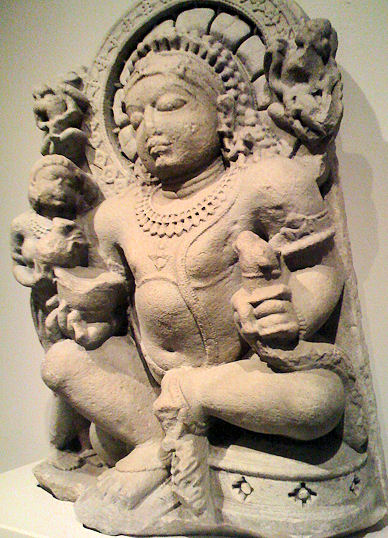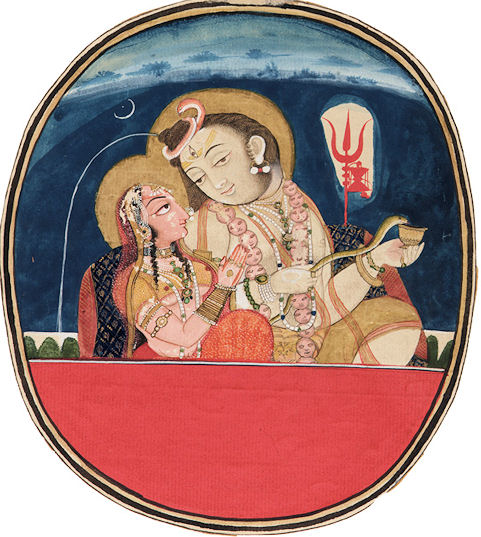

Mit den Auflösungen nach dem "Key" neu herausgegeben von Alois Payer
Zitierweise | cite as:
Apte, Vaman Shivaram <1858 - 1892>: The student's guide to Sanskrit Composition (Being a treatise on Sanskrit Syntax). -- 3. ed. -- 1890. -- 07. Lesson VII. -- Fassung vom 2010-02-11. -- URL: http://www.payer.de/apte/apte07.htm
Ursprünglich erschienen als:
Apte, Vaman Shivaram <1858 - 1892>: The student's guide to Sanskrit composition : being a treatise on Sanskrit syntax ; for the use of schools and colleges. -- 3rd ed. -- Poona : R. A. Sagoon, 1890. -- 450 S.
A Key to Apte's Guide to Sanskrit composition : giving a close rendering into English and Sanskrit of all the Sanskrit and English sentences / compiled by an experienced graduate teacher. -- 2d ed. -- Bombay : Standard Pub., 1923. -- 136 p. ; 18 cm
Erstmals hier publiziert: 2009-06-08
Überarbeitungen: 2010-02-11 [Ergänzungen]
©opyright: Public domain
Dieser Text ist Teil der Abteilung Sanskrit von Tüpfli's Global Village Library
Falls Sie die diakritischen Zeichen nicht dargestellt bekommen, installieren Sie eine Schrift mit Diakritika wie z.B. Tahoma.
Die Devanāgarī-Zeichen sind in Unicode kodiert. Sie benötigen also eine Unicode-Devanāgarī-Schrift.
Use of brackets:
<> = Apte`s own Notes (loc. cit. pp. 277ff.)
[] = A Key to Apte's Guide to Sanskrit composition : giving a close rendering into English and Sanskrit of all the Sanskrit and English sentences / compiled by an experienced graduate teacher. -- 2d ed. -- Bombay : Standard Pub., 1923. -- 136 p. ; 18 cm
{} = Notes by Alois Payer
§ 60. The person to whom something is given is called संप्रदान. A noun denoting संप्रदान is put in the Dative case; as, किं वस्तु विद्वन् गुरवे प्रदेयं (Raghuvaṃśa V.18) 'O learned Sir, what is to be given to the preceptor?' The person or thing with reference to whom or having in view which an action is done is also संप्रदान; as, युद्धाय संनह्यते (Mahābhāṣya) 'he prepares for battle'; तां नन्दनाय प्रार्थयते (Mālatīmādhava 1) 'he demands her for Nandana.'
(a) 1 In the case of the root यज् 'to sacrifice' or 'to give as in a sacrifice,' the person to whom the sacrifice is offered is put in the Instrumental; as, पशुना रुद्रं यजते (Siddhāntakaumudī) 'he sacrifices a bull to Rudra.'
1 यज्ञेः कर्मणः करणसंज्ञा संप्रदानस्य च कर्मसंज्ञा । (Vārttika)
§ 61.1 In the case of the root रुच् 'to like,' and others having the same signification, the person or thing that is pleased or satisfied is put in the Dative case; as, यत्प्रभविष्णवे रोचते (Śakuntalā 2) 'what pleases your Lordship'; यज्ञदत्ताय स्वदते ऽपूपः (Kāśikā) 'Yajñadatta likes Apūpa.'
1 रुच्यर्थानां प्रीयमाणः । (Pāṇini I.4.33) {'In case of verbs having the signification of the root ruc 'to like', the person or thing that is pleased or satisfied, is called Sampradāna or recipent.' Transl. Vasu, 1891}

Abb.: जलेबी
नाम कश्चिदपूपविशेषः
[Source: Haroldandkumar / Wikipedia. Public domain]
§ 62.1 The person to whom something is due (the creditor) in the case of the root धृ (10 cl.) 'to owe,' and the thing desired in the case of स्पृह्, are put in the Dative case; as, वृक्षसेचने द्वे धारयसि मे (Śakuntalā 1) 'thou owest me two sprinklings of trees'; परिक्षीणो यवानां प्रसृतये स्पृहयति (Bhartṛhari, Vairāgyaśataka 45) 'an impoverished person desires a handful of barley corn.'
1 धारेरुत्तमर्णः । स्पृहेरीप्सितः । (Pāṇini I.4.35-36) {'35. In the case of the verb dhāri 'to owe,' the creditor is called Sampradāna. 36. In the case of the verb spṛh to desire, the thing desired is called Sampradāna karaka.' Transl. Vasu, 1891}
Obs. Derivatives from स्पृह् are sometimes construed with the dative; as, भोगेभ्यः स्पृहयालवः (Bhartṛhari, Vairāgyaśataka 64) 'desirous of enjoyments'; कथमन्ये करिष्यन्ति पुत्रेभ्यः पुत्रिणः स्पृहां (Veṇīsaṃhāra 3) [How will other fathers desire to have sons (living).]; but generally with the Lokative; स्पृहावती वस्तुषु केषु मागधी (Raghuvaṃśa III.5) [For waht things has the Princess of Magadha a desire? i.e. what things does she long for?]
§ 63.1 The roots क्रुध्, द्रुह्, ईर्ष्य्, असूय् and others having the same sense, govern the Dative of the person against whom the feeling of anger, hatred, malice &c., is directed; as, हरये क्रुध्यति-द्रुह्यति-ईर्ष्यति-असूयति वा (Siddhāntakaumudī) 'he is angry with, or bears hatred towards, Hari.' But क्रुध् and द्रुह्, when preceeded by prepositions, govern the Accusative; as, मच्छरीरमभिद्रोग्धुं (Mudrārākṣasa 1) 'to do injury to my person'; न खलु तामभिक्रुद्धो गुरुः (Vikramorvaśīya 3) 'did not the preceptor get angry with her?'
1 क्रुधद्रुहेर्ष्यासूयार्थानां यं प्रति कोपः । क्रुधद्रुहोरुपसृष्टयोः कर्म । (Pāṇini I.4.37-38) {'37. In the case of the verbs having the sense of krudh to be angry, druh to injure, īrṣya to envy, asūyā to detract, the person against whom the feeling of anger &c., is directed is called Sampradāna. 38. But in the case of the verbs krudh and druh, when preceded by prepositions, the person against whom the feeling of anger &c., is directed is called karma karaka or object." Transl. Vasu, 1891}
§ 64.1 In the case of the root श्रु with प्रति or आ meaning 'to promise,' the person to whom something is promised, is put in the Dative case; as, प्रतिशुश्राव काकुत्स्थस्तेभ्यो विघ्नप्रतिक्रियां (Raghuvaṃśa XV.4) 'Kakutstha promised them the removal of obstacles.'
1 प्रत्याङ्भ्यां श्रुवः पूर्वस्य कर्ता । (Pāṇini I.4.40) {'In the case of the verb śru preceeded by the prepositions prati and āṅ; and meaning 'to promise,' the person to whom promise is made (lit: the person who was the agent of the former verb) is called Sampradāna.' Transl. Vasu, 1891}
§ 65.1 The purpose for which an action is done, or that for making which another thing exists or is used (as a thing made for a caertain purpose) is put in the Dative case; as, काव्यं यशसे (Kāvyaprakāśa 1) 'a poem (is composed) for fame'; यूपाय दारु (Mahābhāṣya) 'a piece of wood for (making a sacrificial) post'; कुंडलाय हिरण्यं (ibid.) 'gold is (used) for Kuṇḍala (ornament)'; अवहननाय उलूखलं (ibid.) 'a mortar for pounding down.'
1 तादर्थ्ये चतुर्थी वाच्या । (Vārttika)
Abb.: कुण्डलम्
Sigiriya - සීගිරිය, Sri Lanka
[Source: Wikipedia. Public domain]
(a)1 When the sense of an infinitive of purpose is suppressed in a sentence, the object of this infinitive is put in the Dative case; as, फलेभ्यो याति = फलान्याहर्तुं याति 'he goes for fruits', i.e. 'to bring fruits'; वनाय गां मुमोच = वनं गन्तुं गां मुमोच 'he let loose the cow for (i.e. to go to) the forest.' Here फल and वन, the objects of the infinitives आहर्तुं and गन्तुं, are put in the Dative.
1 क्रियार्थोपपदस्य च कर्मणि स्थानिनः । (Pāṇini II.3.14) {'The fourth case-affix is employed in denoting the object (karma) of that verb, which is suppressed (sthāni) in a sentence, and which has in construction (upapada) therewith another verb, denoting an action, performed for the sake of the future action (kriyārthe III.3.10). In other words, when the sense of an infinitive of purpose formed by tumum and nvul (III.3.10,) is suppressed in a sentence, the object of this infinitive is put in the Dative case.' Transl. Vasu, 1891}
(b) 1 The Dative of an abstract noun is often used to express the sense of the infinitive of purpose from the root; as, यागाय याति = यष्टुं याति 'he goes to offer a sacrifice'; so समिदाहरणाय प्रस्थिता वयं (Śakuntalā 1) [We have set out to bring holy sticks]; यतिष्ये वः सखीप्रत्यानयनाय (Vikramorvaśīya 1).
1 तुमर्थाच्च भाववचनात् । (Pāṇini II.3.15) {'The fourth case-affix is employed after a crude-form which ends in an affix denoting 'condition' (abstract noun, III.3.11.) and having the force of the affix tum (or Infinitive of purpose).' Transl. Vasu, 1891}
§ 66.1 In the case of the root कॢप् 'to be adequate to,' 'to bring about,' 'to tend to,' and roots having a similar sense, such as संपद्, भू, जन् &c., the result brought about, or the end to which anything leads, is put in the Dative case; as, कल्पसे रक्षणाय (Śakuntalā 5) 'thou art adequate to bring about (our) protection'; मूत्रय कल्पते-जायते-साम्पद्यते यवागूः (Mahābhāṣya) 'gruel tends to (produce) urine.' The Dative is frequently used in this sense without भू or अस्; as, यतस्तौ स्वल्पदुःखाय (Pañcatantra I) 'since they two cause very little pain.'
1 कॢपि संपद्यमाने च । (Vārttika)
(a)1 That which is foreboded by a portentous phenomenon is also put in the Dative case; as, वाताय कपिला विद्युत् (Mahābhāṣya) 'the tawny lightning forebodes a hurricane'; मांसौदनाय व्याहरति मृगः (ibid.) 'the sound of a deer indicates (the getting of) food of flesh.'ṭ
1 उत्पातेने ज्ञापिते च । (Vārttika)
(b) With the words हित and सुख the Dativ is used; as, ब्राह्मणाय हितं-सुखं (Siddhāntakaumudī) 'good for a Brāhmaṇa'; हितमामायाविने (Mahābhāṣya) 'good for a sickly person.'
Obs. हित in the sense 'good in or to' is used with the Locative and Genitive also.
§ 67.1 The words नमः, स्वस्ति, स्वाहा, स्वधा, and वषट् (terms used in offering oblations to gods &c.), and अलं in the sense of 'a match for,' 'sufficient for,' govern this case; as, नमो विश्वसृजे तुभ्यं (Raghvaṃśa X.16) 'a bow to you who created the universe'; स्वस्ति भवते (Malāvikāgnimitra 2) 'good-bye to you'; अग्नये स्वाहा (Siddhāntakaumudī) 'this offering to Agni'; similarly पितृभ्यः स्वधा, इन्द्राय वषट्; दैत्येभ्यो हरिरलं (Siddhāntakaumudī) 'Hari is a match for the demons'; अलमेषा क्षुधितस्य (मे) तृप्यै (Raghuvaṃśa II.39) 'this (cow) is sufficient to satisfy my who am hungry.'
1 नमःस्वस्तिस्वाहास्वधालंवषट्योगाच्च । (Pāṇini II.3.16) {'The fourth case-affix is employed in conjunction with the words namaḥ 'salutation', svasti 'peace',' svāhā, svadhā (terms used in offering oblations to Gods and Pitṛs respectively), alam ' a match for' 'sufficient for' and vaṣat a term of oblation.' Transl. Vasu, 1891}
(a) Words having the sense of अलं 'sufficient for,' 'able to do,' such as प्रभु, शक्त and even the verb प्रभू, are used with the Dative; as, प्रभुर्मल्लो मल्लाय, शक्तो मल्लो मल्लाय, प्रभवति मल्लो मल्लाय (Mahābhāṣya) 'one wrestler is a match for another'; विधिरपि न येभ्यः प्रभवति (Bhaṭṭikāvya II.94) 'over whom even the Creator does not prevail.'
(b) नमः joined to कृ generally governs the Accusative, but sometimes the Dative also; as, मुनित्रयं नमस्कृत्य (Siddhāntakaumudī) 'saluting the three sages'; but नमस्कुर्मो नृसिंहाय (ibid.) 'we salute Nṛsiṃha.'

Abb.:
नमस्कुर्मो नृसिंहाय
Mayapur -
মায়াপুর
[Source: GourangaUK /
Wikipedia. GNUFDLicense]
(c) Roots meaning 'to salute', such as प्रणिपत्, प्रणम्, are construed with the Dative or Accusative; as, धातारं प्रणिपत्य (Kumārasaṃbhava II.3) 'saluting the creator'; also तस्मै प्रणिपत्य नन्दी (Kumārasaṃbhava III.60), आर्यं प्रणिपत्य (Mudrārākṣasa I); so, तां भक्तिप्रवणेन चेतसा प्रणनाम (Kādambarī 228) [Bowing down to her with a mind bent down (humble) by devotion]; तां कुलदेवताभ्यः परणमय्य (Kumārasambhava VII.27); प्रणम्य त्रिलोचनाय (Kādambarī 131).
Note. Classical authors occasionally use the nouns also derived from these verbs with the Dative; as, मूर्ध्ना प्रणामं वृषभध्वजाय चकार (Kumārasambhava II.62); अस्मै प्रणाममकरवम् (Kādambarī 142); तस्मै दण्डप्रणाममकरवम् (Daśakumāracarita I.2) [I fell prostrate before him like a staff, i.e. with every part of the body touching the ground].
(d) In greeting and in expressing a blessing, the dative is used with words like स्वागतं, कुशलं; as, देवदत्ताय कुशलं (Mahābhāṣya); स्वागतं देव्यै (Mālavikāgnimitra 1) 'welcome to the Queen.' Words like कुशलं, भद्रं, सुखं &c. are used with the Genetive also. see Lesson X.
§ 68. The roots कथ्, ख्या, शंस्, and चक्ष्, all meaning 'to tell,' (contrary to the principle of दुह्याच्पच् &c.), the causa of विद् with नि (contrary to § 44), and other roots having the same sense, govern the Dative of the person to whom something is told; आर्ये कथयामि ते भूतार्थं (Śalkuntalā 1) 'O worthy lady, I tell you the truth'; एहि इमां वनस्पतिसेवां काZयपाय निवेदयावः (Śakuntalā 4) 'come, let us communicate this service of the trees to Kāśyapa;' soयस्मै ब्रह्मपारायणं जगौ (Uttararāmacarita 4) 'to whom he sang (revealed) the Veda'; यस्मै मुनिर्ब्रह्म परं विवव्रे [Expounded, explained] (Mahāvīracarita 2).
§ 69. Verbs meaning 'to send' or 'dispatch' generally govern the Dative of the person, but Accusative of the place, to whom or which a thing is sent; as, भोजनेन दूतो रघवे विसृष्टः (Raghuvaṃśa V.39) 'a messenger was sent to Raghu by Bhoja'; माधवं पद्मावर्तीं प्रहिण्वता देवरातेन (Mālavikāgnimitra 1) 'by Devarāta sending Mādhava to Padmāvatī.'
§ 70.1 The secondary or indirect object of the root मन् 'to think' (cl. 4), which is not an animal, takes either the Accusative or Dative, when contempt is to be shown; as न त्वां तृणाय तृणं वा मन्ये (Siddhāntakaumudī) 'I do not consider thee to be worth a straw.'
1 मन्यकर्मण्यनादरे विभाषाप्राणिषु । (Pāṇini II.3.17) {'In denoting the indirect object, which is not an animal, of the verb manya 'to think,' the Dative case is optinally employed, when contempt is to be shown.' Transl. Vasu, 1891}
Obs. When no negation or contempt are meant, but mere comparison, the Accusative alone is used; as त्वां तृणं मन्ये (Mahābhāṣya) 'I consider thee as a straw'; but हरिमप्यमंसत तृणाय (Śiśupālavadha XV.61).
§ 71.1 In the case of roots implying motion, the place to which motion is directed is put in the Dative or Accusative case when physical motion is indicated; as, ग्रामं ग्रामाय वा गच्छति; but मनसा हरिं व्रजति 'he goes to Hari mentally' (contemplates him).
1 गत्यर्थकर्मणि द्वितीयाचतुर्थ्यौ चेष्टायामनध्वनि । (Pāṇini II.3.12) {'In the case of roots implying motion, the place to which motion is directed takes the affix of the 2nd (Accusative) or the 4th (Dative) case in denoting the 'object,' when physical motion is meant, and the object is not a word expressing 'road.' Transl. Vasu, 1891}
Obs. (1) राधीक्ष्योर्यस्य विप्रश्नः (Pāṇini I.4.59) i.e. the person, with regard to whom some questions as to good fortune or welfare are asked, is put in the Dative in the case of the roots राध् 'to propitiate' and ईक्ष् 'to look to the welfare of any one'; as, कृष्णाय राध्यति ईक्षाते वा गर्गः (i.e. पृष्टो गर्गः शुभाशुभम् पर्यालोचयति);
(2) परिक्रयणे संप्रदानमन्यतरस्यां (Pāṇini I.4.44) i.e. the price at which a person is employed on stipulated wages is put in the Instrumental or Dative case; as, शतेन शताय वा परिक्रीतो ऽयं दासः.
नैतन्न्याय्यम् । सवज्ञस्याप्येकाकिनो निर्णयाभ्युपगमो दोषाय ॥१॥ (Mālavikāgnimitra 1)
<Notes: सर्वज्ञस्य has the sense of the instrumental. 'Undertaking to decide by only one person, however conscient, is liable to be faulty.'>
[Key: न्यायादनपेयं न्याय्यम् । निर्णयस्याभुपगमः ।
This is not just. The arriving at a decision by one, although all-knowing (very learned), is likely to be faulty.]
चपलो ऽयं बटुः कदाचिदस्मत्प्रार्थनामन्तःपुरेभ्यः कथयते ॥२॥ (Śakuntalā 2)
[Key: This fellow is mischievous. He may possibly tell the ladies of the harem about my longing for Śakuntalā.]
अहमपि वैतानिकम् शान्त्युदमस्यै गौतमीहस्ते विसर्जयिष्यामि ॥३॥ (Śakuntalā 3)
<Notes: अस्मै scil. बालकाय>
[Key: वैतानिकं - belonging to a sacrifice (वितान). शान्त्यर्थमुदकं शान्त्युदकं.
I, too, will send for her by Gautamī, sacrificial water having power to allay (her torment).]
स्पृहयामि खलु दुर्ललितायास्मै । मृगतृष्णिकेव नाममात्रप्रस्तावो मे विषादाय कल्पते ॥४॥ (Śakuntalā 7)
[Key: दुष्टं ललैतमस्य दुर्ललितः । मृगाणां तृष्णास्यां मृगतृष्णिका । नाम एव नाममात्रअम् तस्य प्रस्तावः ।
Surely I long for the company of this obstinate boy. The mention of his mere name may led me to dejection like mirage.]
मूर्ख नैष तव दोषः । साधोः शिक्षा गुणाय संपद्यते नासाधोः ॥५॥ (Pañcatantra I.18)
<Notes: साधोः 'given to a good person.'>
[Key: Fool, this is not your fault. Instruction given to a good (able) disciple proves beneficial or leads to an excellent result, and not to a bad man.]
प्रसीद भगवति वसूम्धरे शरीरमसि संसारस्य । तत्किमसंविदानेव जामात्रे कुप्यसि ॥६॥ (Uttararāmacarita 7)
<Notes. Said by Gaṅgā to Earth when she was angry with Rāma for having abandoned her daughter Sītā. शरीरमसि साम्सारस्य 'you are the very body (mainstay) of worldly life.'>
[Key: Be pleased, divine Earth; thou art the body (support) of the world. Why dost you then, like not knowing things, get angry with thy son-in-law.]
मिथ्यामहात्मगर्वनिर्भरा न प्रणमन्ति देवताभ्यो न मानन्यन्ति मान्यानात्मप्रज्ञापरिभव इत्यसूयन्ति सुचिवोपदेशाय कुप्यन्ति हितवादिने ॥७॥ (Kādambarī 108)
<Notes: मिथ्यामहात्मगर्वनिर्भरः 'full of pride of pretended (false) greatness.' आत्मप्रज्ञा etc. 'they hate the ministers advice, thinking that it (following the advice) is degrading (derogatory to their own wisdom'.>
[Key: मिथ्या च तन्महात्म्यं च मिथ्यामहात्म्यं । तस्य गर्वस्तेन निर्भराः । आत्मनः प्रज्ञा आत्मप्रज्ञा तस्याः परिभवः । An insult to or slighting of. हितं वदतीति हितवादी तस्मै.
Fully inflated with the pride of their vain greatness, they do not bow down to deities, do not honour those who deserve to be honoured, resent to counsel given by ministers as an insult to their own understanding (talent) and get angry with one who tells what is beneficial (for their good).]
प्रतिश्रुतं तेन तस्मै स्वसुरवन्तिसुंदर्याः प्रदानम् ॥८॥ (Daśakumāracarita II.1)
[Key: He has promised him the gift of his sister Avantisundarī.]
चन्द्रपीडः समुपसृत्य पूर्ववदेव तां महश्वेताप्रणामपुरःसरं दर्शितविनयः प्रणमाम ॥९॥ (Kādambarī 219)
<Notes: महाश्वेता्प्रणामपुरःसरं 'first making his salutation (paying his respects) to Mahāśvetā.'>
[Key: महाश्वेतायै प्रणामः महाश्वेताप्रणामः स पुरःसरः यस्मिन्कर्मणि तद्यथा तथा दर्शितो विनयो येन ।
Chandrapīḍa, having approached her, showed respect and bowed to her as before, having first saluted Mahāśvetā.]
प्रणिपत्य
सुरास्तस्मै शमयित्रे सुरद्विषाम् ।
अथैनं तुष्टुवुः स्तुत्यमवाङ्मनसगोचरम् ॥१०॥ (Raghuvaṃśa X.15)
<Notes: अवाङ्मनसगोचरम् 'who is beyond the reach (range) of speech and mind', i.e. who can neither be described nor conceived.>
[Key: सुराणां द्विषः तेषाण् । वाक् च मनश्च वाङ्मनसे ,वाङ्मनसयोः गोचरः, वङ्मनसगोचरः न बव्तीति अवाङ्मनसगोचरस्तम् ।
The Gods bowed down to him, the destroyer of demons (lit. the enemies of gods); and they lauded him, the laudable one, who stands beyond the reach of speech and mind.]
रविमावसते सतां क्रियायै सुधया तर्पयते सुरान् पितॄंश्च
।
तमसां निशि मूर्च्छतां निहन्त्रे हरचुडानिहितात्मने नमस्ते ॥११॥ (Veṇīsaṃhāra 3)
<Notes: An address to the moon. The Amāvāsyā (new-moon day) occurs when the moon enters (आवसति) the body of the sun, but for which, there being no Darśa day, there would be no performances of sacred rites by the pious. सुधया etc. cf. पर्यायपीतस्य सुरैर्हिमांशोह् कलाक्षयः श्लाघ्यतरो हि वृद्धेः (Raghuvaṃśa V. 16), the waning of the moon from day to day being ascribed to his being drunk up, digit by digit, by the Gods and Manes.>
[Key: हस्य चूडा हरचूडा ; हरचूडायां निहतः आत्मा यस्य तस्मै.
Homage to thee who dwellest with the moon that the righteous may perform their holy rites, who satisfiest the gods and the manes with nectar, who dispellest the darkness that prevails by night and whose self (digit) is placed in the crest of Hara (or on his crest by Hara).]
उमा
वधूर्भवान् दाता याचितार इमे वयम् ।
वरः शुंभुरलं ह्येष त्वत्कुलोध्भूतये विधिः ॥१२॥ (Kumārasaṃbhava VI.82)
<Notes: Said by the seven sages to Himālaya when they asked Umā in marriage for Śiva. त्वत्कुल etc. 'this manner (collection of circumstances) is insufficient to elevate your family.'>
[Key: Umā is the bride and you the giver; we here are solicitors (for the hand) and the bridegroom is Śambhu; the combination of these circumstances is sufficient to raise your family.]
चरतः
किल दुश्चरं तपस्तृणबिन्दोः परिशांकितः पुरा ।
प्रजिघाय समाधिभेदिनीं हरिरस्मै हरिणीं सुरांगनाम् ॥१३॥ (Raghuvaṃśa VIII.79)
<Notes: तृणबिन्दोः परिशंकितः 'Indra afraid of Tṛṇabindu' who was practising austere penance. Gods, and especially Indra, are always afraid of the penance of others; cf. Śakuntalā Act 1 - अस्त्येतदन्यसमाधिभीरुत्वं देवानां. हरिणी - name of a nymph.>
[Key: समाधिं (contemplation, penance) भेत्तुं शीलमस्यास्ताम्.
Once Hari (indra), it is said, afraid of Tṛṇabindu practising penance, difficult to be practised, sent against him the heavenly nymph Hariṇī able to break up his contemplation (obstruct his penance).]
वाताय
कपिला विद्युदातपायातिलोहिनी ।
पीता भवति सस्याय दुर्भिक्षाय सिता भवेत् ॥१४॥ (Mahābhāṣya)
[Key: A tawny lightning is for (forbodes) a storm; an exceedingly red one for heat (want of rain); a yellow one indicates (abundances of) corn, while a white one foreshadows famine.]
स्वस्त्यस्तु ते निर्गलिततांबुगर्भं
शरद्धनं नार्दति चातको ऽपि
॥१५॥ (Raghuvaṃśa V.17)
<Notes: Said by Kautsa, when he found Ragu almost penniless, and wished to take his departure. निर्गलितांबुगर्भं etc. 'even the Cātaka does not trouble (press with request) an autumnal cloud, whose watery contents have been poured out or emptied.'>
[Key: निर्गलितमम्बु यस्मात् स निर्गलितांबुः ; निर्गलिताम्बुर्गर्भो यस्य तम् ।
May you fare well? See notes.]
{चातक = Cuculus varius = Common Hawk-cuckoo; oder Clamator jacobinus = Pied Cuckoo. Siehe: Dave, K. N. <1884 - 1983>: Birds in Sanskrit literature. -- Revised ed. --Delhi : Motilal Banarsidass, 2005. -- ISBN 81-208-1842-3. -- S. 494.}
Abb.: Cuculus varius = Common Hawk-cuckoo, Kolkata (কলকাতা)
[Source: J.M.Garg / Wikipedia. GNU FDlicense]
Abb.: Clamator jacobinus = Pied Cuckoo, Hyderabad (హైదరాబాద్, حیدراباد), AP
[Source: J.M.Garg / Wikipedia. GNU FDlicense]
ताभ्यां
तथागतमुपेत्य तमेकपुत्रम्
अज्ञानतः स्वचरितं नृपतिः शशंस ॥१६॥ (Raghuvaṃśa IX.77)
<Notes: 'The king, having approached them, told them of the condition their only son was in, and his own deed done through ignorance.' उपेत्य according to some means उद्दिश्य.>
[Key: तथा गतः तथागतः a compositum सुप्सुपा. Construe - उपेत्य ताभ्यां तथागतं तमेकपुत्रम् अज्ञानतः स्वचरितं च नृपतिः शशंस. For translation see notes.]
परित्राणाय साधूनां
विनाZआय च दुष्कृताम् ।
धर्मस्थाPअनार्थाय संभवामि युगे युगे ॥१७॥ (Bhagavadgītā IV.8)
[Key: For the protection of the virtuous and for the destruction of the performers of unrighteous deeds and for the establishment of religious order, I get born in every age.]
तदाकर्ण्य तामहं दंड्वत्प्रणम्य तस्यै मदुदन्तमखिलमाख्याय विस्मयविकसिताक्षं जनकमदर्शयम् ॥१८॥ (Daśakumāracarita I.4)
<Notes: दंडवत्प्रणम्य 'falling quite prostrate on the ground,' like a stick lying horizontally down.>
[Key: दण्डेन तुल्यं दण्डवत् । मम उदन्तः (news, account) विस्मयेन विकसिते अक्षिणी यस्य तम् ।
Hearing that, I protected myself before her, lying down like a staff, communicated to her my full account and showed her to my father whose eyes brightend with wonder.]
सखि वासन्ति दुःखायेदानीं रामस्य दर्शनं सुहृदाम् । तत्कियच्चिरं त्वां रोदयिष्यामि । तदनुजानीहि मां गमनाय ॥१९॥ (Uttararāmacarita 3)
<Notes: रामस्य दर्शनं सुहृदाम् 'the seeing of friends by Rāma,' 'Rāma's seeing his friends.'>
[Key: Friend Vāsanti, Rāma's visit to (lit. seeing) his friends, now, will cause them sorrow; how long then shall I make you weep (keep you weeping? {Allow therefore me to go.}]
त्वयमेवोत्पद्यन्त एवंविधाः कुलपांशवो निःस्नेहाः पशवो येषां क्षुद्राणां प्रज्ञा पराभिसंधानाय न ज्ञानाय पराक्रमः प्राणिनामुपघाटाय नोपकाराय धन्परित्यागः कामाय न धर्माय । किं बहुना । सर्वमेव येषां दोषाय न गुणाय ॥२०॥ (Kādambarī 288)
<Notes: कुलपांशवः 'a disgrace to the family,' who sully the honour of their family.>
[Key: कुलस्य पांशवः (like dust, digrace to). निर्गतः स्नेहो येषाम् । परेषामभ्संधानं तस्मै ।
Such persons, who are the banes (of disgrace to) their families and who are beasts, destitute of affection, are born as the result of their own mis-deeds, the the talent of whom, mean wretches, is employed in deceiving others and not in gaining knowledge, whose valour is exhibited in the destruction of creatures and not in deeds of benevolence, whose expenditure of money is for the satisfaction of carnal desire and not for righteous deeds; in short everithing connected with whom contribute to wrong and not to virtue.]
श्रोत्रियायाभ्यागताय वत्सतरीं महोक्षं वा निर्वपन्ति गृहमेधिनः ॥२१॥ (Uttararāmacarita 4)
[Key: Householders offer a heifer or a stout bull to a Śrotriya (learned Brāhmaṇa) coming as a guest.]
दुदोह गां स यज्ञाय सस्याय मघवा
दिवम् ।
संपद्विनिमयेनोभौ दधतुर्भुवनद्वयम् ॥२२॥ (Raghuvaṃśa I.26)
<Notes: स = दिलीपः. यज्ञाय 'for the performance of sacrifices,' which keep gods contented. Indra sent down rain (lit. milked the heaven) for corn to grow ; thus the two reciprocated services and supported the two worlds. गां दुदोह 'milked the earth' (took taxes).>
[Key: दुदोह etc. see notes.]
नमस्त्रिमूर्तये तुभ्यं
प्राक्सृष्टेः केवलात्मने ।
गुणत्रयविभागाय पश्चाद्भेदमुपेयुषे ॥२३॥ (Kumārasambhava II.4)
<Notes: An address to Brahman. केवलात्मन् 'who was single, undivided,' गुणत्रय 'rajas, sattva and tamas.' Brahma was afterwards divided at the rimes of creation, the three qualities appearing respectively at the times of creation, preservation, and destruction.>
[Key: I bow to thee who hast three forms, but whose one (undivided) self alone exists before creation; who dividest thyself according to the three qualities and then manifestest a diversity of forms.]
स स्थाणुः स्थिरभक्तियोगसुलभो निःश्रेयसायास्तु वः ॥२४॥ (Veṇīsaṃhāra 1)
[Key: स्थिरा भक्तिः स्थिरभक्तिस्तस्या योगः तेन, स्थिरभक्तिः योगश्च ताभ्यां वा सुलभः । निर्गतं श्रेयो यस्मात् तन्निःश्रेयसं तस्मै ।
May that Sthāṇu (Śiva, the eternal One) easily attainable by means of unswerving devotion (or firm devotion and contemplation) be for your (grant you) final beatitude!]
सर्वः कल्ये वयसि यतते
लब्धुमर्थान्कुदुम्बी
पश्चात्पुत्रैरपहृतभरः कल्पते विश्रमाय ॥२५॥ (Veṇīsaṃhāra 3)
[Key: अपहृतः भरः यस्य ।
Every householder endeavours to acquire money in the first part of his age (youth); afterwards (in old age), the burden (of supporting the family) being removed by his sons, he is able to take rest.]
यदेवोप्नतं दुःखात्सुखं
तद्रसवत्तरम् ।
निर्वाणाय तरुच्छाया तप्तस्य हि विशेषतः ॥२६॥ (Veṇīsaṃhāra 3)
<Notes: दुःखात्सुखमुपनतं 'that happiness which falls to ones lot after (suffering) misery,' the savouriness of the pleasure arising from contrasted enjoyment.>
[Key: The happiness alone which comes after misery has better flavour (is better enjoyed): the shade of a tree is for cooling especially of (gives relief particularly to) one who is heated (oppressed by heat).]
शुद्धान्तसंभोगनितान्तदुष्टे न
नैषधे कार्यमिदं निगाद्यम् ।
अपां हि तृप्ताय न वारिधारा स्वादुः सुगन्धिः स्वदते तुषारा ॥२७॥ (N. III. 95)
[Key: शुद्धान्ते संभोगाः शुद्धान्तसंभोगाः तैः नितान्तं तुष्टः तस्मिन् ।
The business should not be mentioned (entrusted) to Naiṣadha (Nala) who is quite satiated with the enjoyment of the pleasures of the harem; the stream of water, sweet, scented and cool, is not relished by one who has his fill of water.]
किमित्यपास्याभरणानि यौवने धृतं
त्वया वार्द्धकशोभि वल्कलम् ।
वद प्रदोषे स्फुटचन्द्रतारका विभावरी यद्यरुणाय कल्पते ॥२८॥ (Kumārasaṃbhava V.44)
<Notes: अरुणाय कल्पते 'is fit to receive Arua,' the harbinger of the sun, which indicates the close of night.>
[Key: वृद्धस्य वृद्धाय वा भावो वार्द्धकम् । वार्द्धके शोभते तद्वार्द्धकशोभि । स्फुटाः चन्द्रः तारकाश्च यस्यां सा.
Casting away ornaments in youth, why is it that you have pu on bark garments fit for old age? Say if the night, at its beginning, with the moon and the stars clearly displayed (brithly shining) in it, is fit to approach Aruṇa (dawn).]
पुंसामसमर्थानामुपद्रवायात्मनो
भवेत्कोपः ।
पिठरं क्वथदतिमात्रं विजपार्श्वानेव दहतितराम् ॥२९॥ (Pañcatantra I. 14)
[Key: The anger of powerless persons proves to their own trouble only; an earthen pot, with the liquid in it fiercely boiling, burns severely its outer sides only.]
पयःपानं भुजंगानां केवलं
विषवर्धनम् ।
उपदेशो हि मुर्क्खाणां प्रकोपाय न शान्तये ॥३०॥ (Hitopadeśa 3)
[Key: Giving of milk as drink to serpents is simply to increase their poison; advice given to fools serves to irritate them and not to pacify them.]
प्रतिवाचमदत्त केशवः शपमानाय न
चेदिभूभुजे ।
अनुहुंकुरुते घनध्वनिं न हि गोमायुरुतानि केसरी ॥३१॥ (Śiśupālavadha XVI. 25)
<Notes: अनुहुंकुरुते 'roars in return.'>
[Key: Keśava gave no reply to the King of Cedi (Śiśupāla) abusing him; the lion roars in reply to the roar of clouds and not to the howling of jackals.]
संतानकामाय तथेति कामं रज्ञे
प्रतिश्रुत्य पयस्विनी सा ।
दुग्ध्वा पयः पत्रपुटे मदीयं पुत्रोपभुङ्क्ष्वेति तमादिदेश ॥३२॥ (Raghuvaṃśa II.
65)
<Notes: तथेति saying 'yes'. संतानकामाय 'who longed for issue or progeny.'>
[Key: संतानः कामो यस्य तस्मै । पत्राणां पुटं पत्रपुटं तस्मिन् । Construe - सा पयस्विनी संतानकामाय रज्ञे तथा इति कामं प्रतिश्रुत्य हे पुत्र मदीयं पयः पत्रपुटे दुग्ध्वा उपभुंक्ष्व इति तमादिदेश ।
That cow, rich in milk, having promised his wish to the king, who desired progeny, saying 'be it so', directed him thus - drink my milk, O son, having drawn a leaf-vessel.]
तस्याः प्रसन्नेन्दुमुखः
प्रसादं गुरुर्नृपाणां गुरवे निवेद्य ।
प्रहर्षचिह्णानुमितं प्रियायै शशंस वाचा पुनरुक्तयेव ॥३३॥ (Raghuvaṃśa II.68)
<Notes: तस्याः goes with प्रसादं. line c/d 'Communicated to his beloved the favour of the cow, inferred from the signs of delight (on his face), in words which were, as it were, superfluous,' as the very appearance of delight informed the queen of the auspicious event.>
[Key: प्रसन्नश्चासौ इन्दुः प्रसन्नेन्दुः स इव मुखं यस्य । प्रहर्षस्य चिह्नानि प्रहर्षचिह्नानि तैः अनुमितम् ।
Construe - प्रसन्नेन्दुमुखः नृपाणां गुरुस्तस्याः प्रहर्षचिह्नानुमितं प्रसादं पुनरुक्तया इव वाचा गुरवे निवेद्य प्रियायै शशंस ।
The lord of kings his face like the bright moon (or with his moon-like face smiling) having reported to his preceptor by word of mouth, repeated as it were, her favour, inferred from the signs of joy, communicated it to his wife.]
ततो यथावद्विहिताध्वराय तस्मै
स्मयावेशविवर्जिताय ।
वर्णाश्रमाणां गुरवे स वर्णो विचक्षणः प्रस्तुतमाचचक्षे ॥३४॥ (Raghuvaṃśa V. 19)
[Key: यथावद्विहितः अध्वरः येन तस्मै । स्मयस्यावेशस्तेन विवर्जिताय । वर्णाश्च आश्रनाश्च वर्णाश्रमाश्तेषाम् ।
Thereupon the learned ascetic (Brahmacārin) told his purpose (the business for which he had come) to him, the master of the castes and the stages of life, by whom a sacrifice had been duly performed and who was free from the influence of vanity.]
वसन्स तस्यां वसतौ रघूणां
पुराणशोभामधिरोपितायाम् ।
न मैथिलेयः स्पृहयांबभूव भर्त्रे दिवो नाप्यलकेश्वराय ॥३५॥ (Raghuvaṃśa XVI.42)
<Notes: पुराणशोभां &c. 'restored to his former grandeur or magnificence.' न स्पृहयांबभूव &c., 'did not at all envy the happiness of either.' because he already enjoyed it in his capital.>
[Key: The son of Maithilī (Sītā, - Kuśa), living in that city (lit. residence) of the Raghus, which was restored to its original grandeur, did not envy (the happiness of) the lord of heaven (Indra) or even the lord of Alakā (Kubera).]

Abb.: कुबेर
[Source: Zereshk / Wikipedia. GNU FDLicense]
तस्यै स्पृहयमाणो
ऽसौ
बहुप्रियमभाषत ।
सानुनीतिश्च सीतायै नाक्रुधन्नाप्यसूयत ॥
संक्रुध्यसि मृषा किं त्वं दिदृक्षुं मां मृगेक्षणे ।
ईक्षितव्यं परस्त्रीभ्यः स्वधर्मो रक्षसामयम् ॥
रावणाय नमस्कुर्याः स्यात् सीते स्वस्ति ते ध्रुवम् ।
अन्यथा प्रातराशाय कुर्याम त्वामलं वयम् ॥३६॥ (Bhaṭṭikāvya VIII. 76-78,98)
<Notes: दिदृक्षुं - त्वं शुभा न वेति द्रष्टुमिच्छन्तं. 'It is the very charakter of demons that they should make inquiries about others' wives.' नमस्कुर्याः scil. यदि.>
[Key: अनुनीत्या सहितः सानुनीतिः.
He (Rāvaṇa), longing for her, said many a sweet thing to her (or talked sweetly a great deal) assuming a conciliatory tone, he neither got angry nor found fault with Sītā. O fawn-eyed one, why dost thou, in vain, get angry with me, who wish to look at you? To make enquiries about (the well-being of) the wives of others is but the duty of Rākṣasas.
If thou wouldst bow down (submit) to Rāvaṇa, the indeed, O Sitā, thou wilt fare well (wilt be save); if not, we shall have thee enough for (eat thee up at) our morning meal.]

Abb.: Raja Ravi Varma (രാജാ
രവി വര്മ ) <1848
- 1906>: Rāvaṇa kidnapping Sītā and killing Jātāyu
[Source: Wikipedia. Public domain]
All translations from the Key.
1. Wretched man, do you like services in the house of a Cāṇḍāla ?
नरहतक (नरापसद) चाण्डालगृहे सेवा तुभ्यं रोचते किम् ॥१॥
2. Lady, do not misunderstand me, and do not get angry with me in vain.
आर्ये अलं मामन्यथा गृहीत्वा or मामन्यथा गृहाण । मय्हं वृथा मा कुप्य च ॥२॥
3. I do not long for (स्पृह्) wealth, but immortal glory.
नाहं धनाय स्पृहयामि किंतु शाश्वताय - अविनाशिने or नित्याय यशसे ॥३॥
4. Having promised Lakṣmaṇa to accompany him, why do you now tell him that you are unable to do so ?
लक्ष्मणाय त्वया सहागमिष्यामि - or तव सहचरो भविष्यामीति प्रतिश्रुत्य किमिति संप्रति तं ब्रूषे कर्तुं नाहं समर्थ इति or अहमसमर्थ इति ॥४॥
5. Being greatly delighted at hearing the account, they communicated (विद् with नि) to him even their very secrete.
तद्वृत्तान्तश्रवणेनातिव मुदिताः or प्रीताः - हृष्टाः &c. त आत्मनो गोप्यानि - रहस्यान्यपि तस्मै न्यवेदयन् ॥५॥
6. Even a sight of this pious men will bring about (कॢप्) my purification; I shall, therefore, wait upon them for the accomplishment of my desired object.
एतेषां पादणानां - पुण्यदर्शनानां - पुण्यात्मनां - पुण्य- धर्मशीलानां - दर्शनमपि मम शुद्धये - पवित्रीकरणाय - पूत्यै कल्पेत । अतो ऽहं मम - इष्टसिद्धये or अभिमतसिद्ध्यर्थं - समीहित- अभीष्टप्राप्त्यै एतानुपासिष्ये or उपस्थास्ये ॥६॥
7. I told him (ख्या with आ) through my brother that I had nothing to do with seeing him.
तस्य दर्शनेन न किमपि - स्तोकमपि मम कार्यं or प्रयोजनं or को ऽप्यर्थः or न काचिदिष्टसिद्धिः - इति भ्रातृमुखेन - द्वारा तस्मायाख्यम् ॥७॥
8. Old lady, such sad thoughts will only result in greater sorrow; therefore compose yourself for a time.
भवति or आर्ये एते उद्वेगकराः - शोकावहाः or दुःखकराः संकल्पाः अधिकतराय विषादाय - दुःखाय - शोकाय - कल्पेरन् or भवेयुः । अतः संस्थम्भय, पर्यवस्थापयात्मानं स्थिरीक्रियतामात्मा - कंचित्कालम् ॥८॥
9. The enjoyment of pleasures in this world leads only to disgust.
अस्मिञ्जगति विषयोपभोगः - विषयसुखास्वादः - सुखनिर्वेशः केवलं विषादाय - उद्वेगाय भवति or कल्पते ॥१०॥
10. My subjects bear hatred towards (असूय्) me and plot against (द्रुह्) my life.
11. First salute (प्रणम्) your preceptor and then begin to learn your lesson.
आदौ or प्रथमं गुरुं प्रणम ततो ऽधयनम् ॥११॥
12. A bow to the three-eyed God, who reduced Cupid to ashes with the fire of his third eye.
येन त्रिनेत्रेश्वरेण तृतीयनेत्राग्निना कामो भस्मावशेषीकृतः or यस्तृतीयनेत्राग्निना कामं भस्मसाचकार तस्मै प्रणमामि ॥१२॥

Abb.: त्रिनेत्रेश्वरः शिवः
[Source: Wikipedia. Public domain]
13. When a man gets a son, he pays off the debt to his fathers.
यदा नरः पुत्रं लभते तदा स पितृभ्यो देयमृणमपकरोति or परिशोधयति ॥१३॥
14. You yourself are able to defeat (use अलं) the whole troop of the enemy.
त्वं or यूयमखिलशत्रुसैन्यायालम् ॥१४॥
15. When a man is doomed by fate, even a trifling cause is sufficient (अलं) to bring about his ruin.
दैवेनोपहते नरे स्वल्पमपि कारणं तस्य नाशायालम् ॥१५॥
16. I shall send a messenger to the king of Videha and communicate to him this glad tidings.
विदेहनाथाय दूतं विस्रक्ष्यामि or विसर्जयिष्यामि तस्मायिमां प्रीतिदां - प्रमोद- हर्षकरीं वार्तां निवेदयिष्यामि च ॥१६॥
To Lesson VIII.